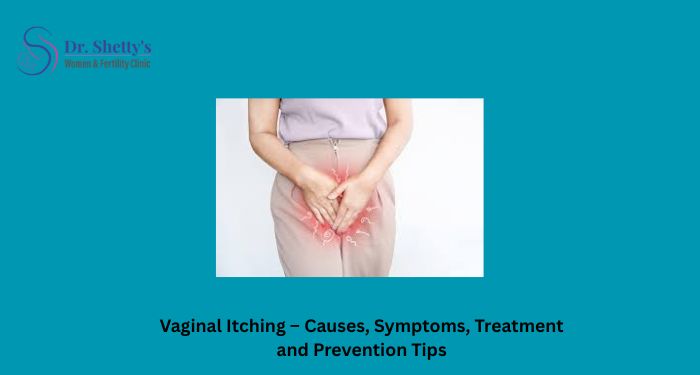Vaginal itching is a common yet uncomfortable condition that many women experience at some point in their lives. While it can be caused by something as simple as irritation from clothing, it may also be linked to infections, allergies, or underlying medical conditions. Understanding the causes, recognizing the symptoms, and knowing when to seek medical care are essential for maintaining intimate health.
In this blog, we will explore the causes, symptoms, treatment options, and prevention tips for vaginal itching while highlighting the importance of timely medical consultation.
What is Vaginal Itching?
Vaginal itching refers to irritation and discomfort in or around the vaginal area. It can be mild or severe and may sometimes be accompanied by burning, redness, swelling, or abnormal discharge. Although occasional itching is not usually a cause for concern, persistent itching should never be ignored, as it may indicate an infection or other health problem.
Common Causes of Vaginal Itching
1. Yeast Infections (Candidiasis)
One of the most common causes, yeast infections occur due to an overgrowth of the fungus Candida. Symptoms often include itching, burning, thick white discharge, and swelling.
2. Bacterial Vaginosis (BV)
This condition arises from an imbalance of bacteria in the vagina. BV can cause itching, along with a thin, grayish discharge and a strong fishy odor.
3. Sexually Transmitted Infections (STIs)
Certain STIs, such as trichomoniasis, chlamydia, or genital herpes, can cause vaginal itching, pain, and abnormal discharge.
4. Skin Irritation and Allergies
Harsh soaps, scented products, detergents, or even tight synthetic clothing can irritate the sensitive vaginal skin, leading to itching.
5. Hormonal Changes
During menopause or pregnancy, hormonal fluctuations may cause dryness in the vaginal area, resulting in itching and discomfort.
6. Urinary Tract Infections (UTIs)
Though primarily affecting the urinary system, UTIs can sometimes cause irritation and itching around the vaginal region.
7. Lichen Sclerosus or Dermatitis
These skin conditions cause patches, rashes, and persistent itching in the genital area.
Symptoms Associated with Vaginal Itching
Along with itching, women may notice other symptoms depending on the cause:
- Burning sensation during urination or intercourse
- Redness and swelling in the vaginal area
- Thick, white, cottage-cheese-like discharge (common in yeast infections)
- Thin, watery, or foul-smelling discharge (BV or STIs)
- Small blisters or sores (herpes infection)
- Pain and discomfort while sitting or walking
If you experience any of these symptoms along with itching, it is best to consult a gynecologist immediately.
Treatment for Vaginal Itching
Treatment depends on the underlying cause, which is why diagnosis by a healthcare provider is essential. Common treatment approaches include:
- Antifungal Medications: For yeast infections, doctors may prescribe antifungal creams, suppositories, or oral tablets.
- Antibiotics: For bacterial vaginosis or STIs, antibiotics or antiviral medications are necessary.
- Topical Ointments: For irritation or dermatitis, soothing ointments or corticosteroid creams may be prescribed.
- Hormonal Therapy: In cases of vaginal dryness due to menopause, estrogen creams or hormone therapy can help.
- Lifestyle Modifications: Avoiding scented products, wearing cotton underwear, and maintaining hygiene can reduce recurrence.
Prevention Tips for Vaginal Itching
- Maintain Proper Hygiene: Wash the vaginal area gently with plain water and avoid harsh soaps or douches.
- Wear Cotton Underwear: Breathable fabrics prevent moisture buildup that encourages infections.
- Stay Dry: Change out of wet clothes, such as swimsuits or gym wear, promptly.
- Safe Sexual Practices: Use protection and get regular screenings to prevent STIs.
- Balanced Diet: Probiotics like yogurt can help maintain a healthy vaginal flora.
- Avoid Irritants: Stay away from scented sanitary products, deodorants, and harsh detergents.
- Regular Checkups: Visit your gynecologist for regular health checkups and screenings.
When to Consult a Doctor
Seek medical attention if:
- Vaginal itching is persistent or severe
- You notice unusual discharge or odor
- There are blisters, sores, or rashes
- Itching is accompanied by pain, fever, or pelvic discomfort
- Over-the-counter remedies do not provide relief
Timely diagnosis ensures proper treatment and prevents complications.
Conclusion
Vaginal itching can be uncomfortable and sometimes embarrassing, but it is a common condition that should never be ignored. Identifying the cause is the key to effective treatment and long-term relief. Whether the itching is due to a simple irritation or a more serious infection, consulting a healthcare professional ensures the right approach to recovery.
By practicing good hygiene, wearing comfortable clothing, and maintaining a healthy lifestyle, you can significantly reduce the risk of vaginal infections and itching. Always listen to your body and seek expert advice when symptoms persist.

